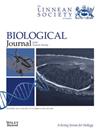Visual cues do not function in a multimodal signalling context for mate attraction in eastern gray treefrogs
IF 2
3区 生物学
Q3 EVOLUTIONARY BIOLOGY
引用次数: 0
Abstract
Anurans use different sensory modalities to communicate and interact socially, including acoustic, chemical, tactile, and visual signals. In a multimodal context, these sensory modes can transmit different information to the receiver or even reinforce the same message. In this study, we hypothesized that body colour traits and vocal sac movements of male eastern gray treefrogs [Dryophytes versicolor (= Hyla versicolor)] serve as secondary visual cues that increase their attractiveness while calling to attract mates. We tested this hypothesis using playback trials combining synthetic advertisement calls with a variety of visual cues, including differently coloured resin frog models, simulated vocal sacs, and live frogs. None of the visual stimuli tested impacted female choice, and there was no difference in response rate, response time, choice angle, or distance covered in the arena between multimodal and unimodal stimuli. However, females showed a strong preference for longer calls even if the less attractive calls were paired with a visual stimulus. The study provides comprehensive insights into the role of visual stimuli in the mate attraction of eastern gray treefrogs and suggests that call traits play a dominant role in the male-selection process of this species, contrary to what was observed for visual stimuli.视觉线索在东部灰树蛙交配吸引的多模式信号环境中不起作用
有尾类利用不同的感官模式进行交流和社会互动,包括声音、化学、触觉和视觉信号。在多模态环境中,这些感官模式可以向接收者传递不同的信息,甚至强化相同的信息。在本研究中,我们假设雄性东部灰树蛙(Dryophytes versicolor (= Hyla versicolor))的体色特征和声囊运动可作为次要视觉线索,在鸣叫吸引配偶时增加其吸引力。我们使用合成广告呼叫与各种视觉线索(包括不同颜色的树脂蛙模型、模拟声囊和活蛙)相结合的回放试验来验证这一假设。所测试的视觉刺激都不会影响雌蛙的选择,多模态刺激和单模态刺激在反应速度、反应时间、选择角度或场内覆盖距离方面都没有差异。然而,雌性对较长的鸣叫表现出强烈的偏好,即使吸引力较弱的鸣叫与视觉刺激配对。该研究全面揭示了视觉刺激在东部灰树蛙配偶吸引过程中的作用,并表明在该物种的雄性选择过程中,叫声特征起着主导作用,这与在视觉刺激中观察到的情况相反。
本文章由计算机程序翻译,如有差异,请以英文原文为准。
求助全文
约1分钟内获得全文
求助全文
来源期刊
CiteScore
4.30
自引率
10.50%
发文量
140
审稿时长
3-6 weeks
期刊介绍:
The Biological Journal of the Linnean Society is a direct descendant of the oldest biological journal in the world, which published the epoch-making papers on evolution by Darwin and Wallace. The Journal specializes in evolution in the broadest sense and covers all taxonomic groups in all five kingdoms. It covers all the methods used to study evolution, whether whole-organism or molecular, practical or theoretical.d.

 求助内容:
求助内容: 应助结果提醒方式:
应助结果提醒方式:


